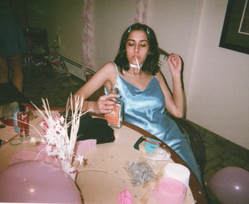 Leah Brundige has reviewed Every Day There is Something About Elephants in the Boston Small Press and Poetry Review.
Leah Brundige has reviewed Every Day There is Something About Elephants in the Boston Small Press and Poetry Review. (follow the link or read below)
Leah also does reviews at the Review Review, which ironically doesn't have a Department of Redundancy Department. It's all very mysterious, but it's an outstanding review which I am grateful for. Of course my addict mind feels the phrase "
The gritty realism of that terrible last
sentence" might confuse people that the sentence is terrible rather than the subject of it being terrible. Here's the sentence:
You burned your
lips on a crack pipe, without the warning: The
glass on this pipe reaches extreme temperatures. Handle with care. You
didn’t care. The blisters popped and fused your lips together.
Factually I did spend a Fourth of July in New York City at age twenty-five--the 100th anniversary of the Statue of Liberty---and I was so high, and I couldn't get enough in my system. My lips blistered, broke, and stuck together. Yes, it was terrible, but I was writing that based on the experience 25 years later.

These two pictures show what else was going on in 1986

Anyway, some of the stories in Elephants were written before sobriety, others draw off the feelings that I was going through at those times, and still, others were current situations different people were going through. Enough about that, this post was about the wonderful review that Leah wrote.When other writers take time to write a review, it certainly is a gift.
-----------------------------------------------------------
Every Day There Is Something About Elephants (Big Table Publishing)
Review by Leah Brundige
Timothy Gager’s engaging new collection of flash fiction, Every Day There Is Something about Elephants, shows a novelist’s interest in human interactions and vivid details coupled with a poet’s gifts for compression and figurative language. The book’s 107 stories vary in tone, scope, and length, but none is longer than four pages. Some—such as “The Lottery Winner,” a tour de force at just a page in a half—deploy and develop an extraordinary number of characters relative to their size, while others navigate the constraints on their length by more poetic means, turning on a single pun (“Chiller”) or extended metaphor (“How penguins break”). The reader is carried along by their expert pacing and, in many cases, by their sheer shock value—Gager is a master of the twist ending.
The subject matter of these short-shorts is often harrowing, and the author is unafraid to write with sympathy, if not approval, of the seedier sides of human nature and society. Abused or addicted, homicidal or lecherous, his characters command our attention as they grope through their flawed livestoward connection or transcendence. Gager is frugal with his imagery, but he knows how to illuminate a character’s plight with a painful, well-chosen detail when the story calls for it:
You burned your lips on a crack pipe, without the warning: The glass on this pipe reaches extreme temperatures. Handle with care. You didn’t care. The blisters popped and fused your lips together.
The gritty realism of that terrible last sentence might seem at first glance to be at odds with another strain that runs through Gager’s work: a domestic surrealism that at times borders on whimsy. The elephant-haunted narrator of the collection’s title story recounts details that at first seem merely absurd (“How did I know an elephant had been in the refrigerator? He left his footprint in the cheesecake”) but become more disquieting as the narrative progresses, until we realize that the “elephants” are manifestations of the character’s mental disturbance. The conclusion brings the elephant metaphor to chilling culmination and unsettles the reader with all that it leaves unsaid. The story recalls Ernest Hemingway’s famous “Hills like White Elephants,” another piece of short fiction animated by its pachydermal symbolism, though the judicious silences in Gager’s narrative threaten to make Hemingway’s measured withholding of information look like a parlor trick.
If the familiar concerns of Gager’s fiction—domestic violence, firearms, and drinking among them—recur frequently in these stories, they never feel repetitive; Gager’s imaginative resources are considerable, and imbue each piece with its own freshness of character or circumstance. They are stories that, however grim on the surface, rejoice in their own brevity and technique. This immensely readable book affirms the prolific Gager’s literary gifts, and showcases a kind of short story that seems, by the collection’s end, entirely his own.








